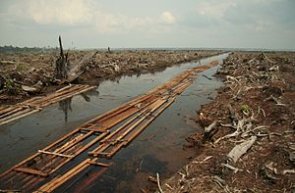Environmental Issues in Indonesia
Environment issues in Indonesia include deforestation; water pollution from industrial wastes, sewage; air pollution in urban areas; smoke and haze from forest fires. International environmental groups have pressed Jakarta to accept environmental responsibility its territories, monitor pollution in its national territorial waters and to take legal action to prevent the destruction of its rain forests. Since the late 1960s, the government has addressed increasing environmental problems by establishing resource-management programs, conducting environmental-impact analyses, developing better policy enforcement, and enacting appropriate laws to give government officials proper authority. Despite these efforts, corruption, overlapping competencies among government departments, and legal uncertainties about departmental jurisdictions have slowed progress against environmental degradation. [Source: Library of Congress *]
Indonesia’s geography leaves the nation vulnerable to severe flooding, unpredictable drought and plant pest attacks, volcanic activity, and earthquakes, which are sometimes associated with tidal waves (tsunami). The most important environmental issues associated with human activities are forest degradation (unregulated cutting, fires, smoke and haze, and erosion); water pollution from industrial wastes and sewage; air pollution from motor vehicles and industry in urban areas, and generally from smoke and haze caused by forest fires; and threats to biodiversity and rare plant and animal species. *
Centuries-old patterns of resource exploitation in Indonesia began to change very rapidly in the late twentieth and early twenty-first centuries. The rice-growing peasantry is shrinking as a result of mechanization, fertilizer use, and intensification of agriculture; the coastal commercial sector has been transformed by overfishing and new technology for interisland commerce; and traditional swidden farming communities of the upland forest have been increasingly crowded out by industrial logging. *
The cumulative effects of rising population density, urbanization, agricultural intensification, resource extraction, and manufacturing have had a significant impact on the Indonesian environment in recent decades. Home to the world’s largest reef system, one of its largest expanses of rain forest, and some of its richest areas of biodiversity, Indonesia is now experiencing serious environmental deterioration.
The greatest threat to the environment in Indonesia is development. The head of the World Wide Fund for Nature in Indonesia told the New York Times, “We are in a constant race with development. Before we even have a chance to convince the wider audience here that environmentally sound development is a viable way to do things, the plans to build roads, factories or power plants are already moving ahead. We have a problem here with unemployment, so any developer who can sell promises of employment will get support. When that happened, we get labeled as against employment and get treated as outsiders.” Going hand in hand with this is Indonesia’s rising population and a lack of money for environmental programs.
The use of ozone-layer-depleting chemicals in India and China and to a lesser extent in Indonesia threaten to cancel out progress made in reducing the use of these chemicals in the developed world.
Environment - international agreements: party to: Biodiversity, Climate Change, Climate Change-Kyoto Protocol, Desertification, Endangered Species, Hazardous Wastes, Law of the Sea, Ozone Layer Protection, Ship Pollution, Tropical Timber 83, Tropical Timber 94, Wetlands signed, but not ratified: Marine Life Conservation [Source: CIA World Factbook]
Indonesia’s Long History of Living in Peace with Nature
The people of Indonesia have a long history of living peacefully with the environment. On the islands of Banda, there were ecologically-minded taboos against cutting trees in areas that provided sources for drinking water, disrupting breeding areas for fish and disturbing forests with medical plants. These rules were passed on orally from one generation to the next. On Sumatra, there are jungle taboos such as bathing naked, sharing food from the same pot or dangling one’s leg over the edge of the platform they sleep on. Many local people regard the tiger as an enforcer of proper behavior and believe that a person who is killed by a tiger is being punished for some crime or transgression or broken taboo.










